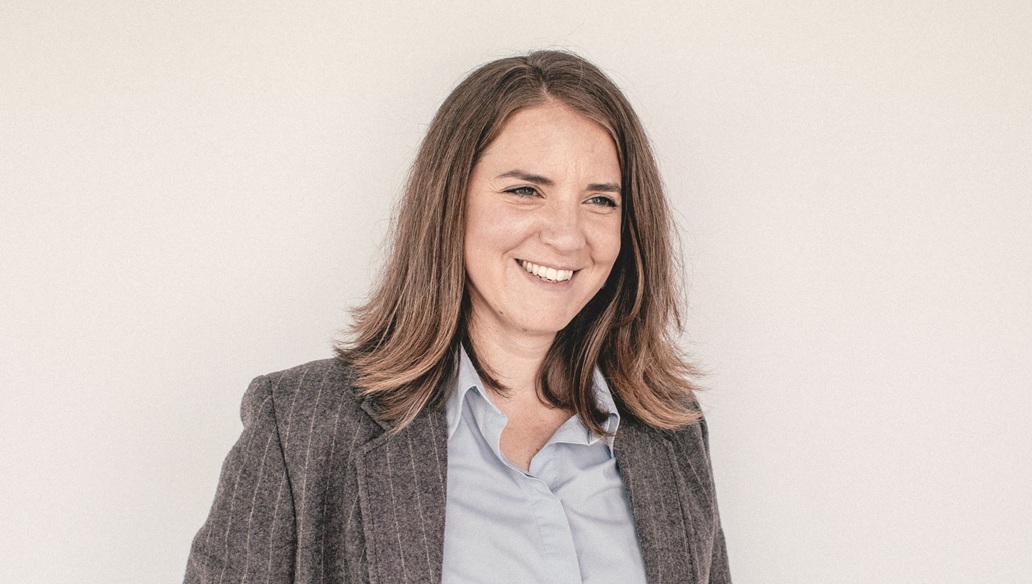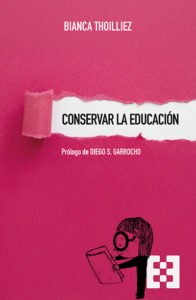- Humanities
- 17 de November de 2025
- No Comment
- 14 minutes read
Bianca Thoilliez: “True teaching competence is moral and intellectual”

Interview with Bianca Thoilliez, writer, researcher and educator. / Photo: courtesy of the author.

Eva Serra
“Education is not about avoiding conflict, but about accompanying pupils as they learn to take responsibility for it — to inhabit it with discernment, judgement and words”. Removed from the noise of the everyday and approaching education through reflection, Bianca Thoilliez’s latest book offers a passionate defence of the art of teaching and the enduring value of learning while inspiring hope in those who, like its author, seek to preserve education (Conservar la educación, Ediciones Encuentro, 2025). An essay open to the enlightened traditions of educational thought that aims to confront the anti-intellectual challenges of the dominant pedagogical model.
Bianca Thoilliez is Associate Professor of Teoría e Historia de la Educación in the Departament of Pedagogy at the Autonomous University of Madrid. She has been a visiting researcher at the Institute of Education, University of London, and at the University of Pennsylvania. Author of more than a hundred scholarly articles in leading journals of education and pedagogy, she is also a regular contributor to the newspaper ABC.
Her academic work includes chapters in collective volumes, translations, and numerous national and international lectures. Her research focuses on philosophy and the theory of education, the analysis of educational policy, and the ethics of the teaching profession.
How can we overcome the current conflict in education brought about by the rise of competency-based pedagogy?
The conflict will not be resolved by setting methodologies against each other, but by recovering the question of what teaching is for. Competency-based pedagogy has introduced a productivist, performance-driven logic that measures education by its capacity to produce visible outcomes. Yet teaching is not — or not only — about producing results; it is, above all, about passing on a cultural legacy. To move beyond this conflict, we must reconcile the idea of competence with that of knowledge: there can be no genuine competence without content, no deep learning without transmission. Without content, there is nothing — and this must be acknowledged and re-examined. The rise of competency-based pedagogy has gone hand in hand with the replacement of truly pedagogical language by another — administrative, bureaucratic, psychologising, economistic. We have lost the words that once gave meaning to teaching: to teach, to transmit, authority, content. Recovering them is also a way of overcoming the conflict, for without them we cannot think or speak properly about education — about what actually happens when one person teaches and another learns.
“We have lost the words that gave meaning to teaching: ‘to teach’, ‘to transmit’, ‘authority’, ‘content’. Recovering them is also a way of overcoming the conflict”
You speak of an educational, but also an economic and political dichotomy. Has polarisation taken away the possibility and the space for dialogue?
Yes, undoubtedly. Education has been absorbed by cultural polarisation: people argue not to understand, but to defeat the other side. This impoverishes the debate, because education requires prudent, reasoned, and cross-cutting agreements. It cannot be built from ideological trenches but must rest on shared ground — on a basic trust in teaching, in culture, and in the school as a common good. As long as party politics insists on using education as a battlefield for symbolic disputes, the possibility of meeting in the middle — of finding common ground — will continue to shrink. To recover that space, we must depoliticise educational practice and repoliticise its aims, bringing it back into the realm of public conversation — which is broader, deeper, and far more important than partisan debate.
“The past is no longer experienced as a constitutive part of the present, but as an era to be denounced, corrected, or simply cancelled”. In educational terms, can we really prepare pupils for an “uncertain future” while cancelling the past?
No — and that is precisely where the greatest danger lies. A future without a past is a future without reference points. Learning requires memory: you cannot innovate without an inherited language, nor can you imagine without a tradition that allows you to imagine something new — something different from what already exists. (And much of what already exists is worth preserving; the mere fact that something is there does not make it obsolete). Preparing for the future cannot mean breaking with what precedes us, but rather learning to value and discern what ought to change. Education does not cancel the past; it welcomes it and offers the forms and meanings through which it can be reinterpreted. You can’t know where you’re going if you don’t know where you’ve come from.

In contrast to the market-driven idea of “efficient teaching”, you argue for “teaching as craftsmanship”. How can we restore the teacher’s craft as a transmitter of knowledge, rather than as a market-oriented prescriber?
We must recognise teaching as an intellectual craft, not as a technical process. The teacher who works as a craftsman doesn’t follow recipes; they interpret, adjust, decide, and experiment. This practice demands time, experience, and judgement — three things that bureaucracy and standardisation tend to erode. Restoring teaching as a craft means giving teachers back their time and autonomy, freeing their work from excessive managerial burdens, and restoring trust in their practical wisdom. Teaching is not about prescribing; it is about interpreting — with knowledge and care.
There are several passages in which you evoke the enriching and timeless connection between teacher and pupil — that encounter where one offers knowledge and the other receives it. Are we in danger of destroying that vital exchange?
That risk certainly exists. What threatens the educational relationship is not technology itself, but the tendency to conceive of teaching as a process of transmitting information, rather than as an encounter between generations mediated by knowledge.
Added to this are the self-proclaimed “geniuses” who claim there is no need to transmit anything at all, since everything is already on the Internet — or because AI will eventually do it all for us. It is, no doubt, a practice under attack. Yet I believe it will not disappear as long as there is someone willing to explain, and someone willing to listen. Still, that relational space must be protected — from distraction, from haste, and from the technocratic discourse that tends to render it invisible. The book is simply an attempt to support this necessary act of resistance.
In your book, you call for the development of a “curricular imagination” that might stretch the canon without breaking it. At this point, do you think that could actually be put into practice? What forms of active resistance would it require?
Yes, it is possible — but it calls for intellectual courage and a sense of responsibility. By curricular imagination I mean the ability to reinterpret the canon without destroying it, to find new ways of expressing what is valuable. This demands a form of active resistance: teachers who read, think and debate; staffrooms that exercise professional judgement; administrations that trust more and impose less. Curricular imagination does not arise from voluntarism but from knowledge: only those who know the tradition deeply can transform it with meaning. The kind of curricular imagination I’m referring to is not about anticipating the future but about keeping the conversation open between past and present — between what we inherit and what we reinterpret. Its aim is not to predict but to offer pupils an intelligible inheritance — one that helps them to understand, and to make the world they live in more habitable, the very world on which they are called to build something new. Everything else is just misguided activism – doing for the sake of doing, doing to post, doing to impress.
“The curricular imagination I speak of is not about anticipating the future, but about keeping open the conversation between past and present”
You quote Arendt in several passages of your book: “Education is not about protecting the child from the world, but about introducing them to it”. Why do you think mainstream pedagogy anchors much of its argument in pupils’ emotions?
Because we live in a culture saturated with emotion — one that confuses, and often replaces, the real paths of learning. Learning is sometimes cognitively demanding: it takes practice, repetition, and time. Yet today it is too easily replaced by a kind of emotional rollercoaster disguised as wellbeing. Emotions are, of course, part of life — and there is life in the classroom, naturally — but they cannot replace knowledge, nor the experience of effort. It is not a question of excluding them, but of placing them at the service of thought. An emotion can open the door to learning, but it cannot replace it or take centre stage all the time. The problem is not that pupils (and teachers) feel things, but that everything is measured in terms of how people feel. That well-meaning pedagogy ends up producing fragility: it seeks to shield children from the world rather than to introduce them into it. Education cannot consist in cushioning reality; it must prepare pupils to inhabit it — with discernment and meaning.
You argue that learning must be driven by a desire for knowledge — a desire that arises outside the family sphere and opens the way to an “encounter with other worlds” (Recalcati, La hora de clase). Has this desire for symbolic exile from the family been replaced by an eternal childhood compensated by endless devices of distraction?
To a great extent, yes. School should be the place where pupils separate themselves symbolically from home, to encounter the world and other adults. Today, that emancipatory function is in crisis. Overprotection and the infinite supply of entertainment offered by digital devices have turned childhood — and especially adolescence — into a prolonged state of dependency and distraction. What now seems to matter is the consumption of experiences, one after another, rather than offering meaningful situations and experiences — experiences that actually mean something, something important, something of genuine worth.
“The desire to know rarely appears by itself or at first attempt. That necessary waiting, that insistence, has been replaced by immediate satisfaction”
The desire to know rarely appears by itself or at first attempt. That necessary waiting, that insistence, has been replaced by immediate satisfaction. That is why the teacher’s task is never mere transmission of content — as critics so often repeat, as if such transmission were simple, even dispensable. The teacher’s work is to awaken the desire to know, to sustain it, and to accompany it. This, too, is a form of hope practised through teaching: trusting that interest can arise where none yet exists, that curiosity can be awakened at any moment. Schools must recover their role as spaces of estrangement — even of mild discomfort — rather than extensions of domestic comfort. (There is a reason pupils sit on chairs, not sofas). Of course, this evolves with age, but the distance and novelty of school in relation to home are vital — and should grow gradually as we advance through the education system.
From the teaching profession, the most critical voices denounce a growing disconnection between so-called “new pedagogy” and the central importance of content. Do you believe that the transformation or alienation of teachers through an overload of competency-based tools and procedures can erode their intellectual resistance and their moral responsibility to teach?
Yes — when they are applied without thought, which happens all too often. In its most bureaucratic form, competency-based pedagogy turns teachers into managers of evidence rather than transmitters of knowledge. That weakens their intellectual resistance because it distances them from thought and judgement. What the education system needs are teachers who can think didactically about their subjects — who can plan and sequence them, persuade their pupils that what they are learning matters and is worth mastering; who can identify achievements, difficulties and mistakes — and then begin again. True teaching competence is moral and intellectual: it means teaching the things that are truly worth learning.
You write that “today’s education systems are caught in the pursuit of the impossible, overly identified with a one-sided vision of the future”. In that persistent demolition of the past, you describe the school as a “device of self-deception”. Can you really fool everyone all the time? (to borrow the phrase wrongly attributed to Lincoln).
For a while, yes. The rhetoric of constant change creates the illusion of progress — even as the essential, the meaningful, deteriorates and enters a cycle of decline and devaluation. But classroom reality always ends up exposing the fiction — and that is what we are seeing now.
We see it at universities: students arrive with excellent grades, supposedly well-prepared, and yet the basics have eroded. You can fill documents with objectives, but if pupils read poorly, or write with spelling and grammar mistakes, the illusion collapses — the scam reveals itself. Education, in the end, is too bound to reality to sustain fiction indefinitely. It shows, unmistakably, when teaching is really taking place — and when it isn’t.
“We don’t need revolutions, but a careful and reflective restoration of schooling — a renewed appreciation of what makes teaching possible”
“Like musicians, teachers are interpreters,” you write in Conservar la educación. You see this interpretive variation of the “score” as both pedagogical renewal and resistance to the tyranny of innovation that seeks to erase our Enlightenment heritage. Is it time to act — time for hope?
Yes, absolutely. Teachers interpret a score — the inherited body of knowledge — but every interpretation is unique, alive, singular. That capacity for variation is, in itself, a form of hope.
Teaching is an act of trust — a belief that the world is worth sharing. That conviction, more than any innovation or reform, is what sustains education and those who make it possible: its teachers. We do not need revolutions, but a careful and reflective restoration of schooling — a renewed appreciation of what makes teaching possible. And I believe there is hope, because every day, in thousands of classrooms, that act of interpretation continues to take place — despite everything. Teaching is an act of lucid resistance, and of trust in the world.
Source: educational EVIDENCE
Rights: Creative Commons

